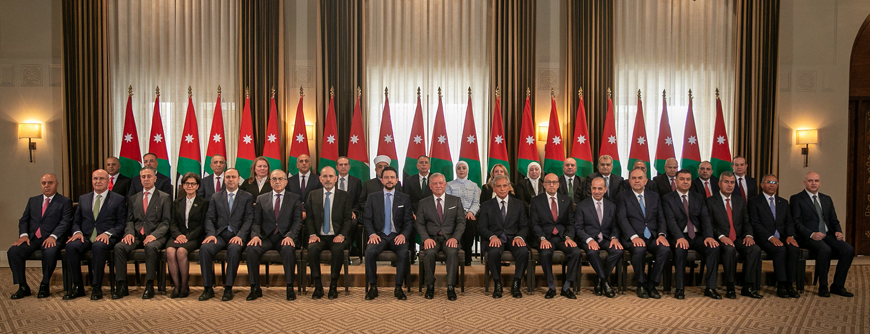AMMAN — A poll conducted by the Centre for Strategic Studies at the University of Jordan revealed an increase in public and opinion leaders' confidence in the government’s performance.
The poll surveyed public opinion in the new government following 100 days in office.
On September 15, His Majesty King Abdullah entrusted Jafar Hassan with forming a new Cabinet.
The government on December 4 won the Lower House's vote of confidence with a majority of 82 MPs of the 135 MPs present.
Hussein Momani, head of the centre, announced the results of the pull, highlighting a positive shift in perception, the Jordan news Agency, Petra, reported.
According to the poll, 70 per cent of opinion leaders believe the government has effectively managed its responsibilities, a significant rise from 52 per cent in a survey conducted after the government’s formation.
Confidence in the prime minister's leadership also improved, with 76 per cent of opinion leaders expressing trust in his ability to address current challenges, compared with 55 per cent previously.
The performance of the ministerial team, excluding the prime minister, was positively rated by 55 per cent of respondents, up from 45 per cent.
The poll also reflected growing optimism across several areas of governance.
Over 55 per cent of opinion leaders expressed confidence in the government’s ability to implement public sector reforms.
Additionally, 59 per cent trusted its capacity to achieve economic reform goals, and 65 per cent were optimistic about its handling of regional issues.
Political reform efforts also received a positive outlook, with 58 per cent expressing trust in the government’s approach.
Economic optimism was a key highlight of the survey, with 59 per cent of opinion leaders and 58 per cent of the general public expressing a positive outlook for Jordan's economy over the next two years.
The findings also identified priority areas for government action. Nearly 44 per cent of opinion leaders' participants emphasised the importance of launching major projects in sectors such as water, transportation, and energy, while 49 per cent called for facilitating investments by simplifying procedures and exploring new opportunities to attract local and foreign investors.
The poll also reaffirmed the strong public trust in the Jordan Armed Forces-Arab Army and the country’s security services, underscoring their role as vital pillars of national stability.
The figures also showed that 51 per cent of grassroots citizens believe the government is capable of meeting the challenges ahead, while 55 per cent of opinion leaders expressed confidence in the performance of the ministerial team.
The survey also revealed that 57 per cent of grassroots citizens have confidence in the current government's ability to lead, surpassing confidence in previous administrations, while trust in state institutions remains high.
Regarding the Prime Minister's field visits, 65 per cent of citizens said they were aware of the visits to their areas. Of these, 34 per cent were positive about the timing and duration of the visits, while 63 per cent praised the instructions given during these visits.
In addition, 52 per cent of citizens are optimistic about the Jordanian economy over the next two years and 51 per cent express confidence in the government's ability to implement its economic reform plan. At the same time, 53 per cent of the national sample are hopeful about the government's ability to manage regional affairs.
When it comes to economic and living conditions, 32 per cent of citizens believe that the government should focus on creating jobs and tackling unemployment, while 21 per cent urge action to curb rising prices. Among opinion leaders, 30 per cent stressed the importance of increasing local and foreign investment to improve economic conditions.
The survey also showed that 41 per cent of citizens believe the government should prioritise improving health and education services, while 49 per cent support mega projects in the water, transport and energy sectors.
In addition, 44 per cent of opinion leaders stressed that the government should have a leading role in shaping new regional policies.
